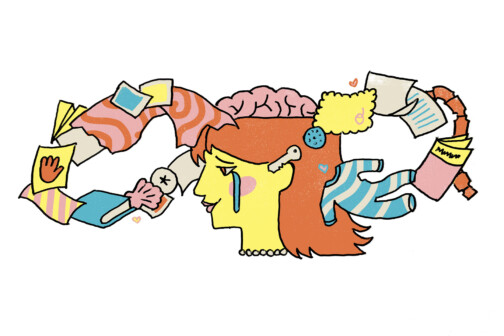When the doorbell rang for the third time, she started to cry. Each shrill chime sounded an alarm within her. The darkened bedroom, shades drawn to shut out the sun, was the only place she could hide. Her security had been shattered by a deliveryman.
Every morning for two months, after dutifully dressing, feeding and seeing her husband and kids off for the day, Valerie (not her real name) would drag herself back to bed. There she would stay, grateful for the darkness, until the children came home. To camouflage what she really did all day, a vacuum cleaner was pulled to the center of a room, a meal staged hastily on the stove.
On the outside, Valerie was an able, affable, attractive 36-year-old wife and mother of two. She had wholeheartedly accepted her role in life: listener, lover, soother, cook, carpool driver, volunteer for the March of Dimes. But on the inside, Valerie was a jumble of raw nerves. She felt a “chronic heaviness-like lead in my heart.” She would smile one minute and be in tears the next.
The doorbell triggered a ringing in her ears. She thought she was going mad. She was afraid someone would find out. She thought of suicide. She called a mental-health hot line instead.
That was two years ago. Today, Valerie has a new life-she’s single and she’s part-owner of a hair salon. Valerie is on the other side of a midlife crisis.
MIDLIFE. The halfway point. The years, give or take, between 35 and 50. The deadline decades.
For many people, the midlife years bring about change. Choices that have been made somehow don’t fit. Shells we have built around us begin to crack. We struggle to break free, to write new rules, to grow. Often, as with Valerie, the process brings pain.
The transition years of midlife are only beginning to be understood. For years, psychiatric research centered on the phases of childhood-the terrible twos, the noisy nines. Much was written about a teen-ager’s inner turmoil and the trauma of old age. But in between were the vast, virtually uncharted decades of adulthood. Most people gave them little thought.
Then came Gail Sheehy’s best-selling book, Passages, and a new pop psychology emerged. Suddenly, everyone was swapping tales of this man’s “male menopause” and that woman’s identity crisis. But beneath the cocktail chatter was a growing, significant body of research that began as far back as the Thirties with Swiss psychiatrist Carl Jung. Those who delved deeper than Sheehy’s best seller discovered a seminal study project by Yale University professor Daniel J. Levinson, later published as The Seasons of a Man’s Life. Farther back, 1950, marked the landmark publication of Erik Erikson’s eight stages of human development.
With Woody Allen’s film Annie Hall and TV heroines such as Maude and Mary Tyler Moore, the insecurities of midlife came out of the closet to be scrutinized on the screen. Just as baby boomers were facing middle age, the blur of midlife slipped into focus – warts and all.
Like all good trends that emanate from the East or West coasts, the midlife crisis as an “event” soon made its way to Dallas. Here, it found a sympathetic breeding ground. “The emphasis on achievement, power and money here reinforces typical male identities,” says Dr. Michael McGill, a professor at SMU and author of The 40-to-60-Year-Old Male. “When those identities are uprooted or questioned in midlife, a guy can fall pretty hard.”
“Dallas’ emphasis on money and possessions is felt keenly by women here,” says psychological associate and counselor Ab-bie Troy. “The more your identity is based on external factors, the more susceptible you are to break down if that force deals you a blow. Your inner sense of yourself becomes dependent on what is delivered to you from the outside. Plus, there is such an influx of people here that have left their support systems behind. The divorce rate is high. The singles scene can be impersonal. People just often find themselves at a crossroads and all alone.”
Dallas or Malibu, trend or no, there is a time in every adult’s life when he begins to “weigh up” – to look at the past, analyze the present and plan for the future. This is not something that happens suddenly. It is a process that begins with unspoken thoughts. Gradually, thoughts evolve into action and words. The midlife transition begins.
THE BUILDUP
A number of factors influence the middle years. Some are common to men and women; others are not. For one, the family structure is shifting. Many adults experience their parents’ aging, illnesses and death during this time. Only recently has a new relationship – adult-to-adult – been refined. Now the roles are reversed -the child becomes the parent. And with a parent’s death comes a new awareness of mortality.
At the same time, a midlife adult finds his own children moving toward independence, resulting in more leisure time for the primary caretaker and more together time for the marriage. Many couples see a renewed intensity – for better or worse – in their relationship.
Divorce is both a cause and a result of crisis in midlife. “Women who have traditionally gotten their self-esteem from a relationship,” says psychological associate Sally St. Clair, “are devastated when [the husband] picks up and walks away. Not only is the divorce a crisis, but she must then cope with being single again.”
Even without a divorce, St. Clair says, “too many women get into trouble during this period because they have measured their identity in external ways. One day they just wake up and say, ’I don’t know how I got here.’ “
“I see women all the time who are very unhappy with their husbands, their children, their sex lives, everything,” says clinical psychologist Dr. Flo Wiedemann. “But it’s very hard for them to get out of their dependency roles. They’re terrified that their husbands will leave them. And it’s a very real fear – many husbands do.”
A woman who has been a homemaker may decide that her intellect has been undernourished. But a woman who has chosen a path outside the home may wake up one day to discover a void in her nurturing side. Says Wiedemann: “They may wish they had found a partner, or they may see a time limit on being able to bear children. They’ve had plenty of sex but no acceptance of its responsibilities and consequences. They are still incomplete.”
Commitment phobia is epidemic, Wiedemann says. And men who have stretched the bachelor role to its breaking point also wind up feeling empty and lost. That happened to Jim, whose preoccupation with dating, drinking and work held him back from a “meaningful relationship” until he finally gave in and got married when he was 50 years old. “That was a turning point in my life,” Jim says. “At 50, marriage itself is a midlife crisis. But I don’t regret it. When our little boy came along, goals began emerging in my life for the first time.”
For most men Jim’s age, a living room crowded with children’s playthings is far less likely than the emptying nest. And though the “empty-nest syndrome” is commonly thought of as it affects women, according to McGill, a developing family can affect a father, too. “For years, Dad has been the family’s link to the outside world,” McGill says. “He has sat at the head of the dinner table and talked about his day on the outside. He’s told them who to vote for and which way the winds of the world blow. Now all of a sudden there’s no one at the table. Mom’s taking a course at the local college and the kids are at soccer practice. Dad is left alone in the house to fend for himself. It’s a tremendous loss to his ego.”
For working men and women, the mid-life decades are a time of reckoning. Goals are no longer written on a distant future. They are within – or beyond – permanent reach. No longer do others view you in terms of your potential. You begin to see a ceiling on your career.
But at the core of every midlife crisis is the coming to terms with death, the realization that life is at least half over. Nothing brings mortality home quite as dramatically as a brush with death – a woman who discovers a lump in her breast; a man who can’t go the distance in a stress test. Even minor events – gray hairs, a sagging chin, shortness of breath – draw attention to the changes in a person’s body, appearance, stamina. Says one 33-year-old woman, “Midlife is when you sprain your ankle playing tennis and it takes two months to heal.”
THE BREAKDOWN
“I’d felt that divorce was inevitable for 15 years,” Adam said in soft, measured tones. “I’d never really thought we were compatible. We had little in common in terms of our likes and attitudes. She was very society conscious – she felt it was important to live in the Park Cities and all. I’m not crazy about parties – my idea of recreation is three days of old Humphrey Bogart flicks.”
At 47, Adam is just beginning to be able to look back with some detachment on the crisis that has marked the past three years of his life – a crisis that resulted in divorce after 20 years of marriage.
“Pat is a bossy woman. Because of her parents and certain things in her background, she always had to have her way. After a few years, I learned it was easier just to give in. So I went along that way for years. My firm was doing fantastic. But it seemed that the more money I made, the less happy we were. The company moved us to Atlanta. We lived in a very nice suburb. Pat found it easy to become a part of the social scene.
“I felt – this sounds dumb – but I felt even more neglected. I felt like all I was was a money machine. Here I was working my tail off and I never even got to do the things I enjoyed.
“You know, I had always thought that when I had enough money I would really love indulging in things like a new Jaguar. None of them did a thing for me. I was miserable. I even thought of doing away with myself a couple of times. But, I don’t know, something stopped me and I thought, ’Hey, I’m not going to do this.’ I told Pat last May that I wanted a divorce. She accused me of trying to ruin our summer vacation plans.
“I did stay through August – we had gone to Brownsville to visit her family. When it came time to go home to Atlanta – I just told her I wasn’t going back. I moved back to Dallas, began seeing someone else and am happy again for the first time in 20 years.”
Most often, midlife crises are viewed in terms of the events in their wake. Long before psychologists noted that certain stages of development were inevitable, we had evidence that midlifers do bizarre things. They get divorced after 20 years of marriage. They grow beards or bleach their hair. They threaten rock-solid jobs by playing the horses. They threaten rock-solid relationships by chasing after 20-year-olds.
To come to terms with the past and choose a path for the future is an awesome task. In The Seasons of a Man’s Life, Lev-inson writes, “A profound reappraisal of this kind cannot be a cool, intellectual process. It must involve emotional turmoil, despair, the sense of not knowing where to turn or of being stagnant and unable to move at all.”
“People in midlife do write hot checks, they do flash, they do shoplift and they do spend money in a frantic attempt to ’wallpaper the Titanic,’ ” says clinical psychologist Robert Littlefield. “They do these things in order to shake up the pattern of their lives. It’s like picking up a Chinese checkerboard and shaking up all the marbles. You risk losing the game, but you may come out with a new configuration.”
An affair is the time-honored dressing for a midlife wound. For women -especially women who see themselves trapped at home – an affair is a reaffirming link to the outside world. Affairs rekindle a sexual excitement that may have been dulled by routine. “When a man begins to see sex as boring, he decides that it must be because his wife is boring,” McGill says. “Most men have a hard time admitting that the blame may lie within themselves.”
An affair wouldn’t be a useful cog in the wheel of transition if it weren’t “fed back into the relationship,” says Littlefield. “It’s the anger, the shouting, the tears that help you break out of the trap.”
A classic midlife reaction is an abrupt lifestyle change: A man leaves sales for social work. A woman leaves home to study abroad. Or, like Peter, a businessman becomes an artist.
“I should have been an artist,” Peter says. “It had always been in the back of my mind. But it took seeing what my kid was doing in art at St. Mark’s to really make me take some action. I had had my own business here for 20 years, and I was bored. Then about the same time, my wife decided to go to law school – she was having her own crisis. We were in marital counseling for five years, then we finally called it quits. I didn’t know I was so stifled, but 1 must have been because I’m sure going crazy now.
“My own finances are pretty heavily tied up in my firm, so I couldn’t just walk away from it. I go to the office in the mornings and devote the afternoons to my art. I’m having a ball being single, double-dating with my 21- and 23-year-old sons. I’m poor, but I’m happy.”
Men, especially, may find that midlife renews a spirit of adventure – of physical danger. Aggressive activity becomes a way of capturing life.
Women endure midlife crises less openly. “Men have sexual flings; women get depressed,” as one woman says. Chronic depression is often coupled with a newfound dependency on pills or alcohol. A woman in painful transition may develop psychosomatic illnesses, fits of spontaneous crying or, like Valerie, contemplate suicide.
THE BREAKTHROUGH
The words “midlife crisis” have the ring of disaster – of a “Help! Somebody come quick!” emergency of the soul. But in truth, midlife is rarely a one-shot critical blow. While many people will experience a moment or two of “crisis,” research suggests that the period is more marked by ebb and flow. For those who can manage to stall the ebb and go with the flow, there can be real rewards.
People most likely to benefit from the evolution in midlife are those who are not too heavily involved in any one area of their lives, says McGill. “A workaholic who’s dealt a blow at work will suffer more than a man who has a more balanced sense of himself.”
Likewise, a woman who has sublimated her own interests and desires and put everyone in her family first will pay a price somewhere down the road. “Work outside the home is one of the great suppliers to the ego,” says one woman who has combined career and family life. “Every task that is accomplished equals a shot of positive self-worth. I don’t get that kind of reinforcement at home.”
For a midlife crisis to be productive, therapists believe, it must be dealt with openly. “Most people are hoping to give off clues with their errant behavior,” says McGill. “Most of the men I interviewed said their wives should have known what they were going through. But, typically, men don’t talk to women about their feelings. When a wife asks ’What’s wrong?’, a husband usually answers, ’Nothing.’ “
Single people are often at a loss for someone to turn to. Cathy, who will turn 40 this July, had had a string of relationships and three engagements but had never married. Her work had brought her great satisfaction, travel – even some minor fame. But the death of her mother two years ago propelled her on a journey to “find herself.” With characteristic vigor, she launched into a series of encounter seminars. She read all the pop psychology books. She became so consumed with her subject that she had little time for anything else.
“I discovered that there was a major discrepancy between what I was and what I had always thought I’d become. Maybe, more importantly, I wasn’t what my mother had wanted me to become. Even facing 40 years old, I still had an image of myself cooing over a baby in a rocking chair. When Mom died, the dream sort of died with her. The reality of my life – that I didn’t even have a man – hit full force. Looking back on it now, all that time spent in self-discovery groups was a bit of overkill. But I think it helped me get through it.”
MIDLIFE, THEN, is essentially a time of growth. It is an unpredictable, stormy adult adolescence. If we accept it as such, the turbulence will be easier to handle.
The stages of adult development havebeen likened to the growth cycle of thelobster, who periodically must break outof his protective shell. For the time it takesfor a new shell to form, the lobster is naked, exposed, vulnerable. But he must endure the process to grow.
WHERE TO TURN FOR HELP
HOT LINES
Suicide and Crisis Center
24-hour crisis intervention 828-1000
CONTACT Dallas
24-hour telephone counseling 361-6624
The Family Place Hot Line
Counseling for domestic violence
941-1991
EMERGENCY TREATMENT
Parkland Memorial Hospital
Psychiatric Emergency Room 637-8761
ONGOING COUNSELING
Couple and Family Consultation Center
3798 Forest Lane 353-0638
Mental Health-Adult Services
Information Counseling & Referral 24-hour telephone service 747-3711
Depressives Anonymous
Mental Health Association
2500 Maple Ave. 748-7825
Family Guidance Center
2200 Main St. 747-8331
Community Psychotherapy Center Inc.
4343 Maple Ave. 528-3722
Southwest Family Institute Clinic
3801 Herschel 521-6970
Pastoral Counseling and Education
Center
2727 Oak Lawn 522-1590
Center for Pastoral Care & Family
Counseling
3611 Swiss Ave. 821-3680
ARE YOU HAVING A MIDLIFE CRISIS?
Take this quiz and find out
1. When you open a newspaper, where is the first place you look?
a) The want ads – surely there are occupations more interesting than yours.
b) The obituaries – you have a frantic compulsion to see if anyone your age has bitten the dust.
c) The advice columns – somehow you find great solace in other people’s tales of woe.
2. The last time you looked in the mirror, you thought…
a) “Hey, not bad for someone myage.”
b) “Do they make Grecian Formula forblonds?”
c) “God, I couldn’t attract a pack ofbloodhounds!”
3. Your idea of a great vacation is…
a) A secluded country inn where you and your spouse can revel in the intimacy you deserve.
b) A week-long crash course in race car driving.
c) Anywhere -including the airport Holiday Inn -where you can be completely, blissfully alone.
4. Your wife has just announced that she will be away on a lecture tour for one week. You feel. . .
a) Relief. At least you won’t have to feign a headache for seven days.
b) Pride. At last she’s getting the recognition she deserves.
c) Excitement. When the cat’s away…
5. Your husband comes home from work one evening and blows up because the bed is not made. You…
a) Condemn yourself for being a slovenly housekeeper and meekly turn to the task.
b) Look him straight in the eye and remind him that he sleeps there, too.
c) Launch into uncontrollable sobs.
6. You think of a midlife crisis as…
a) Something that happens only to men.
b) Something that happens only to emotional weaklings.
c) Something that just about everybody goes through.
RESULTS
1. If you chose a, b or c you may be on the emotional treadmill of midlife. A contemplation of a career change, a preoccupation with death and a helpless feeling of “Is this happening to anyone else?” are hallmarks of the age. Score 1 point for any answer.
2. If you chose a, score 3 points – you have a healthy attitude about your midlifeimage. Add 2 points for b – you’re planning positive action and you can laugh about it. If you circled c, give yourself 1 point – looks aren’t everything, you know.
3. An answer of a or c is worth 2 points.Any vacation that brings you pleasure is aworthwhile investment of time. Score 1point for b. There’s nothing wrong withrace car driving, mind you, but derring-dois typical of the crisis-prone.
4. If you chose a or c, add 1 point to your score. An answer of b gives you 3 points for coping well with the intellectual development of your spouse.
5. Women whose self-worth is tied up in their spouse, experts say, are likely to suffer from a midlife crisis. If you circled a or c, score 1 point. If b best describes the way you would react, add 3 points.
6. If you circled a or b, you may be in for ashock when you or someone close to youbegins to act a bit bizarre. For either answer, add 1 point. Score 3 for answer c.
YOUR SCORE
6 to 8 points – Check the hot line numbers on page 94. The next thing you know, you’ll be wearing love beads and riding a Honda to work.
9 to 11 points – You’re not quite at the breaking point, but you’re flirting with the midlife crazies.
12 to 15 points – Pat yourself on your aching back. You may emerge from adult adolescence unscathed!
Get our weekly recap
Brings new meaning to the phrase Sunday Funday. No spam, ever.
Related Articles

Local News
Bill Hutchinson Pleads Guilty to Misdemeanor Sex Crime
The Dallas real estate operator and erstwhile reality TV star will serve time under home confinement and have to register as a sex offender.
By Tim Rogers

Restaurants & Bars
The Best Japanese Restaurants in Dallas
The quality and availability of Japanese cuisine in Dallas-Fort Worth has come a long way since the 1990s.
By Nataly Keomoungkhoun and Brian Reinhart

Home & Garden
One Editor’s Musings on Love and Letting Go (Of Stuff, That Is)
Memories are fickle. Stuff is forever. Space is limited.
By Jessica Otte


